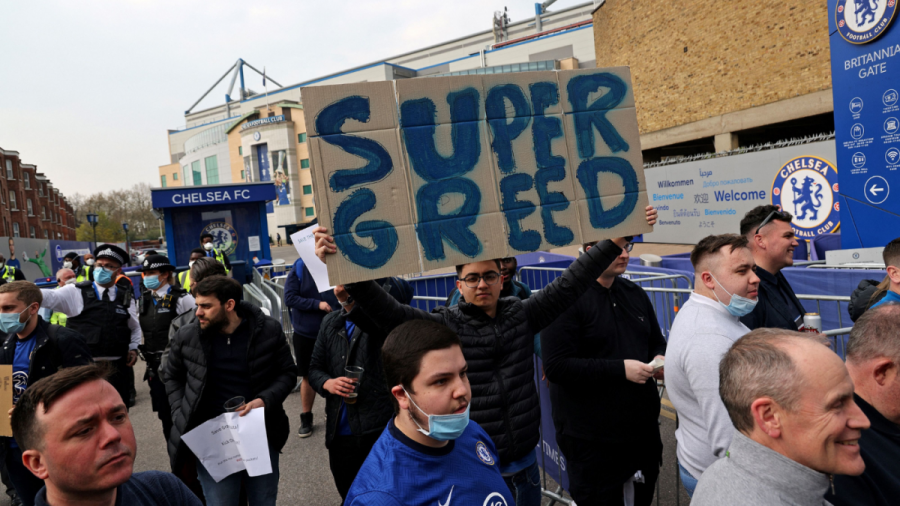The Rise- and Fall- of the Super League
A Clash Between the Fans and Owners Unlike Anything the Sports World Has Seen in Recent Memory
Supporters of Chelsea FC protest the Super League outside of Stamford Bridge.
May 1, 2021
If you asked the typical American for the latest football (soccer) news from around the world, I’m sure they wouldn’t be able to tell you much. However, the recent news about the Super League has caught the attention of every sports fan both in the United States and the rest of the world. The proposed league turned the sporting world upside down, but thanks to the protesting of millions of fans and the endless news coverage, the Super League died as soon as it rose to fame.
On April 18th, twelve of the top clubs from England, Italy, and Spain announced that they would create their own league of competition, which would consist of a mid-week format similar to the Champions League and the Europa League. There were planned to be fifteen teams in the league, and some of the teams that publicly announced they would be joining the Super League were Manchester United, Chelsea, FC Barcelona, Real Madrid, and Juventus. These teams have a combined 24 Champions League titles, and bring in billions of dollars in revenue each year. Each team would earn about $400 million for joining the league, which may seem appealing in a year where nothing was guaranteed due to the pandemic, but it was clear that the negatives drastically outweighed the positives.
Shortly after the Super League announcement, the Union of European Football Associations (UEFA) clearly stated that they were opposed to the Super League. The UEFA announced that teams who participated in the Super League would be banned from all European and world competitions, and even that players would not be able to represent their country in events such as the World Cup. For the owners of these clubs and the Super League, it’s not that big of a deal if UEFA opposes them; but the fans are a whole different story. In the days following April 18th, countless fans from around the world protested the clubs and the Super League for what they saw as selfish and greedy actions. Signs that held messages such as “Cancel Super League”, “Super Greed”, and “Football belongs to us, not you” could be seen on every news station around the planet, and this brought horrible news publicity to the newly formed sports league. This caused the Super League to have another historic press conference.
In between the late hours of April 20th and the early morning of April 21st, Chelsea, Manchester City, Arsenal, Liverpool, Manchester United, and Tottenham all announced that they would be leaving the Super League. With all of the English teams leaving the league, it became clear that the Super League would fold. Later on April 21st, the Super League formally announced that they would have to rethink the project and would be postponing the creation of the league. Andrea Agnelli, the chairman of Juventus FC and the vice-chairman of the Super League, blamed the downfall of the Super League on Brexit, as the English teams leaving started the end of his creation.
The Super League lasted only three days, yet it caused more pandemonium and news coverage than some sports can in a whole year. This just proves how soccer is a truly worldwide sport, and brings billions of people from around the world together, whether in times of good or evil.
Rest in peace Super League. You will not be missed.


